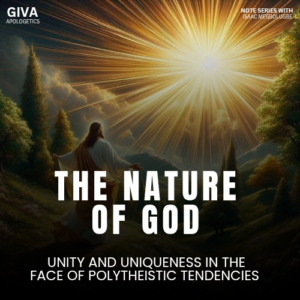
The Nature of God: Unity and Uniqueness in the Face of Polytheistic Tendencies
Isaac Megbolugbe
January 10, 2025
Introduction
The Bible warns against idolatry and polytheism (Exodus 20:3-5, 1 Corinthians 10:14). Yet, the personification of God’s attributes has led to a blurred understanding of God’s nature. This article seeks to clarify the essence of God, the uniqueness of Jesus Christ, and the implications of deviating from this understanding, based on Holy Scriptures.
The Divine Nature of God
God’s nature is divine, transcending creation and humanity (Psalm 102:25-27, John 4:24). God is not a person but a Spirit, designated as holy (Isaiah 6:1-5, John 4:24). Jesus Christ, fully human and fully divine, shares this divinity, inheriting all God’s titles and names (Hebrews 1:1-3, Colossians 2:9).
The Uniqueness of Jesus Christ
Jesus’ relationship with God the Father is one of unity, with the Father in Him and He in the Father (John 14:11, 17:11). This uniqueness is crucial to God’s redemption plan, making Jesus the eternal manifestation of God to humanity (1 Timothy 3:16, Hebrews 1:3).
The Dangers of Personifying God
Declaring God a person erodes Jesus’ uniqueness, opening the door to a pantheon of gods with similar attributes (Isaiah 44:6, Hosea 11:9). The Bible warns against such deviations, emphasizing God’s oneness (Deuteronomy 6:4, Isaiah 44:6).
Conclusion
The integrity of God’s redemption depends on the uniqueness of Jesus Christ as both fully human and fully divine (John 1:1-14, 1 Corinthians 15:1-4). May we uphold this truth, avoiding speculations and manipulations that lead astray (1 Timothy 6:20-21, 2 Timothy 2:15).
References:
– Exodus 20:3-5
– 1 Corinthians 10:14
– Psalm 102:25-27
– John 4:24
– Isaiah 6:1-5
– Hebrews 1:1-3
– Colossians 2:9
– John 14:11, 17:11
– 1 Timothy 3:16
– Hebrews 1:3
– Isaiah 44:6
– Hosea 11:9
– Deuteronomy 6:4
– John 1:1-14
– 1 Corinthians 15:1-4
– 1 Timothy 6:20-21
– 2 Timothy 2:15
💯💯💯💯💯💯💯💯